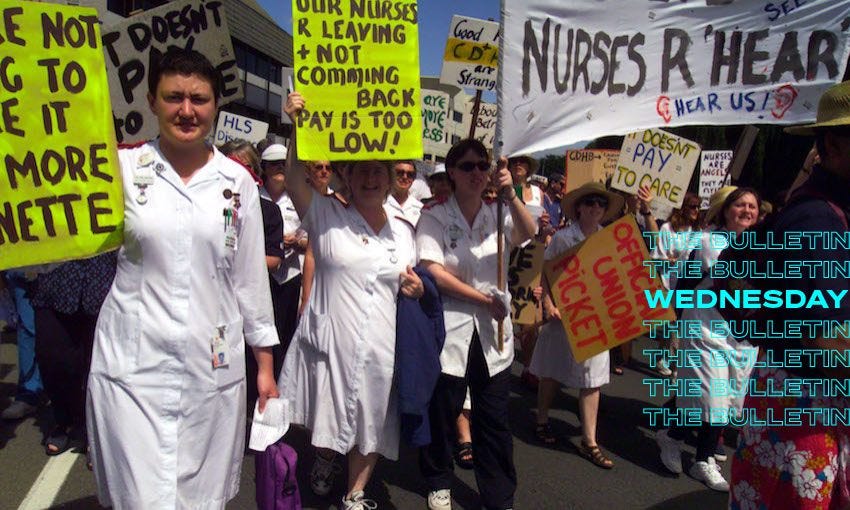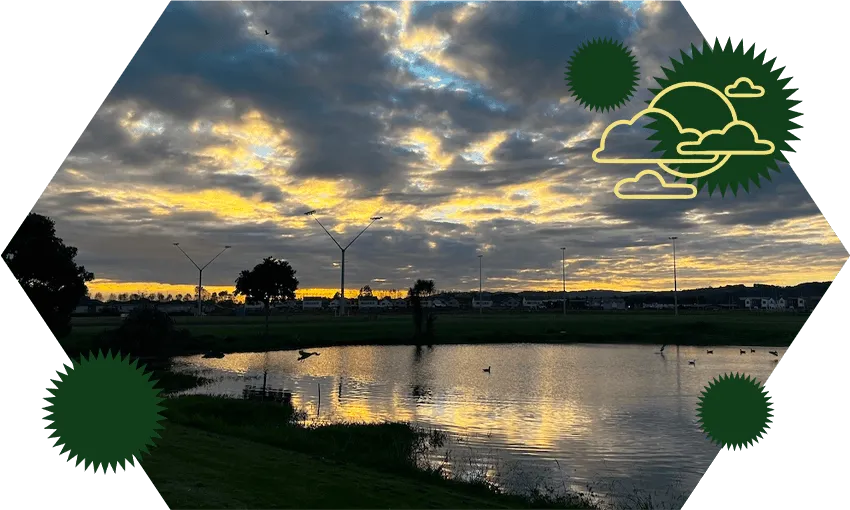Over 100,000 health workers in pay disputes
There are around 235,000 health and care workers in New Zealand. Nurses, allied health and care and support workers are all currently engaged in pay disputes.
Mōrena and welcome to The Bulletin for Wednesday, May 11, by Anna Rawhiti-Connell. Presented in partnership with Z Energy.
In today’s edition: border reopening date to be announced; family violence funding; wallaby hunt in Northland; but first, nurses pay dispute continues.
Nurses’ pay equity fight continues (Photo by Paddy Dillon/Getty Images)
Nurses headed to Employment Relationship Authority
Tomorrow is International Nurses Day. It’s marked each year on the anniversary of Florence Nightingale’s birth. Here in New Zealand, nurses won’t be celebrating, as four years of pay equity negotiations drag on. New Zealand Nurses Organisation (NZNO) members (40,000 of them) were set to vote on an agreement with DHBs last month but, on Monday night instead voted to take the offer to the Employment Relations Authority. A legal review commissioned by the NZNO found the proposed settlement to be contrary to the Equal Pay Act. Speaking to RNZ’s Morning Report yesterday, NZNO chief executive Paul Goulter said "Nurses are sick of it and want to get on with their jobs but they have a deep sense of injustice around gender discrimination”.
Back pay still the sticking point
The NZNO and the Public Service Association (PSA) lodged pay equity claims for nurses in 2017 and 2018. At the crux of it was an assessment of whether nurses, a predominantly female workforce, had received less pay than men in comparable roles. A settlement was announced in early April this year but many nurses were disappointed that new pay rates would not be back-paid to December 2019 as previously agreed. The NZNO is now asking the ERA to rule on the back pay issue, rates for senior nurses and look at a review of the mechanism to ensure pay equity is maintained in the future.
Pay equity issues not confined to nurses
Investigative journalist Rebecca MacFie has written about a stall in further pay equity settlement negotiations for 65,000 care and support workers. The Care and Support Workers (Pay Equity) Settlement Act was passed in 2017. It followed decisions from the Employment Court and Court of Appeal around residential aged care worker Kristine Bartlett’s case. MacFie reports that the expiry date for the 2017 legislation is July 1 and nothing has yet been achieved in getting a replacement or extension for it. Pam King, a home care worker in Invercargill, says she and fellow workers are “totally pissed off”, and strike action is now possible.
Allied health worker strike still set for next week
Meanwhile, 10,000 allied health workers are also engaged in industrial action, working to rule over the next two weeks, doing no more than the duties required by contract, taking all entitled breaks and working rostered hours. They are set to strike on May 16. Hawke's Bay DHB chief executive and spokesperson for DHBs on the matter, Keriana Brooking, said "DHBs still hope to prevent further action next week and that the offer being finalised now will result in the lifting of the strike action”.
A message from our creative director, Toby Morris: Here at The Spinoff we’re proud to be a bit different. In the way we approach our journalism, in our tone, in the things we’re thinking about, all the way through to our design and our videos and our podcasts, we’d like to think we’re doing things and trying things in a way that no other New Zealand media organisations would. And it’s our beloved members that let us do that - both through their financial support, and the encouragement of their engagement: they’re readers who care like we care, who are also interested in seeing things done in a slightly different way. If you like what we’re doing and want to see more of it, have a think about joining up, and help The Spinoff be The Spinoff. Join today!
Border reopening dates to be announced
The NZ Herald is reporting this morning that the date for opening the border to people who need visas to come here is being brought forward from October to July. This includes tourists, family members and partners who have been separated, and students. The prime minister will (virtually) address a Business NZ audience today and is expected to announce it there. Ministers Kris Faafoi and Chris Hipkins will attend in person and speak on immigration issues. Newsroom’s Matthew Scott has taken a look at visa processing delays at Immigration New Zealand, which have been used as a reason for delays in border openings. National immigration spokesperson Erica Stanford said she expects Faafoi will walk back a target to process 80% of one-off residence visas within 12 months, extending the time frame to 18 months.
Government commits $114.5m to eliminate sexual and family violence in a generation
Green Party co-leader Marama Davidson and minister for the preventionof family and sexual violence, announced the funding package yesterday. The funding is allocated to rolling out Te Aorerekura, a national strategy launched in December 2021, over four years. Local democracy reporter Felix Desmarais has a story about the high number of family harm call-outs from emergency accommodation in Rotorua. Council community wellbeing deputy chief executive Anaru Pewhairangi said that between 2017 and 2019, Rotorua police would receive about 70 calls for family harm incidents. "Currently there are upwards of 120 family harm incidents per week," she said. A third of those are coming from emergency accommodation.
From our partners at the Office of the Privacy Commissioner: This week is Privacy Week, and the Office of the Privacy Commissioner wants people to think about who holds their information - and agencies to honour the trust placed in them. The Covid-19 pandemic has transformed our attitudes toward personal data and privacy. But do we really need to hand over our mother’s maiden name when signing up for the latest app The Office of the Privacy Commissioner is working hard to ensure the responsibilities of agencies and businesses are met to protect the taonga that is our personal information. Read more here about why it's important to know where your information is going. (Sponsored)
If it’s not there, maybe it’s hare?
In a story from the Northern Advocate, which involves a “poo hunt”, a local spotted what they thought was a wallaby near Dargaville and reported it. An extensive search, involving the Northland regional council's biosecurity and biodiversity working party and the aforementioned poo hunt, has not turned up any evidence of one. A number of locals were spoken to and said they’d seen a lot of large hares in the area so the consensus is that what was thought to be a wallaby, was in fact, a hare. Wallabies were introduced in New Zealand for hunting but are now deemed a pest.
Got some feedback about The Bulletin, or anything in the news? Get in touch with me at thebulletin@thespinoff.co.nz
Nadine Anne Hura writes about the parallel universes of climate change; Tony Sriamporn looks at why New Zealand is yet to follow the UK and Canada in lifting the 'gay blood ban' for donors; Charlotte Muru-Lanning meets the creator of the epic Māori Shed Party playlist on Spotify; Reweti Kohere learns why the man behind Pic's peanut butter is so excited about the potential for commercial peanut crops in Northland; Tara Ward watches the first episode of Lego Masters NZ.
North versus South on the cards for rugby
According to a report from The Guardian, reported here by Newshub, rugby bosses from Sanzaar, Six Nations and World Rugby are meeting tomorrow in Dublin to discuss a new tournament, played every two years, that would see games played between England, France, Ireland, Italy, Scotland and Wales (the North) and New Zealand, Australia, Argentina, Fiji, South Africa and Japan (the South). The Southern teams would host the Northern teams over our winter and the Northern teams would reciprocate, hosting their Southern counterparts later in the year. The tournament would end with the top teams from each pool playing a semifinal and final in November. The Guardian calls it “the sport’s biggest overhaul since the dawn of professionalism in 1995”.
New Zealand Music Month
Charlotte Ryan writes the unique style of New Zealand musicians for Ensemble.














